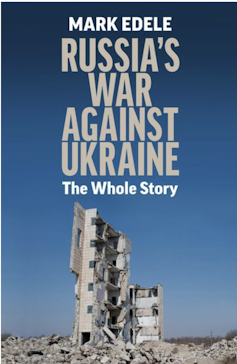in a new book, Mark Edele unpacks what's at stake in a bloody war
- Written by Marko Pavlyshyn, Emeritus Professor, Ukrainian Studies, Monash University

“The whole story” is an unexpected subtitle for a book by a historian. We have long been alert to the fact that, faced with the boundless chaos of empirical facts, historians make selections.
Review: Russia’s War Against Ukraine: The Whole Story – Mark Edele (MUP)
In order to make intelligible narratives, they propose causes and effects. Their accounts imply interpretations and, inevitably, evaluations. The number of potential “stories” about a given topic is infinite.
Historian Mark Edele, author of Stalinism at War: The Soviet Union in World War II[1], The Soviet Union: A Short History[2] and several other highly regarded books, knows this well. His subtitle is a provocation: it accuses his academic field – call it Soviet and Post-Soviet Studies, or Slavic and East European Studies, or Eurasian Studies – of telling us what is patently not the whole story of the Russia-Ukraine relationship.
Edele, along with historian Rebecca Friedman, has begun editing a new series of short books[3] for Cambridge University Press dedicated to “decolonising Soviet history”. By decentralising this history away from Moscow, they write,
contributions will both decolonize Soviet history and provincialize the former metropole: Russia.[…] Why is this worth doing? Russia’s war of aggression against Ukraine has further amplified voices in our field who have called for a ‘decolonization’ of our thinking, writing, and teaching about the former Soviet space. This is an urgent matter.
These words were addressed to scholars. Edele’s new book Russia’s War Against Ukraine[4], by contrast, is chiefly written for non-specialists. The book makes its argument of decolonisation by implication, treating Ukrainian realia[5] as things-in-themselves rather than peripheral parts of an essentially Russian whole.

















